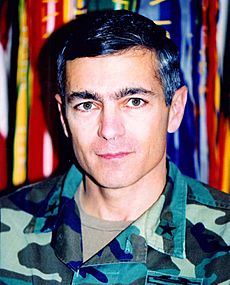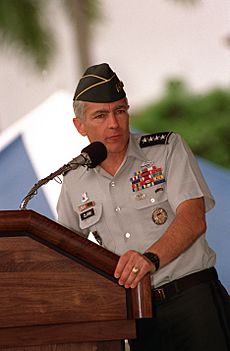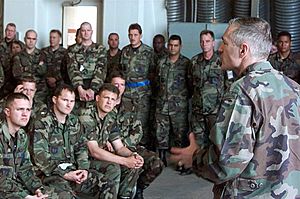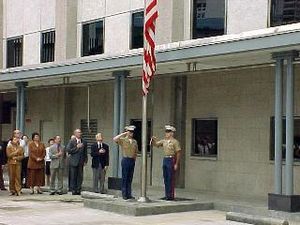Wesley Clark facts for kids
Quick facts for kids
Wesley Clark
|
|
|---|---|
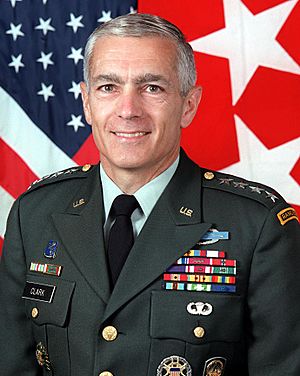
Official portrait, c. 1997–2000
|
|
| Birth name | Wesley J. Kanne |
| Born | 23 December 1944 Chicago, Illinois, U.S. |
| Allegiance | |
| Service/ |
|
| Years of service | 1966–2000 |
| Rank | |
| Commands held | Supreme Allied Commander Europe United States European Command United States Southern Command |
| Battles/wars |
|
| Awards | See all |
| Alma mater | United States Military Academy (BS) Magdalen College, Oxford (BA) U.S. Army Command and General Staff College (MMAS) |
| Spouse(s) |
Gertrude Kingston
(m. 1967) |
| Signature | |
Wesley Kanne Clark (born Wesley J. Kanne, 23 December 1944) is a retired officer from the United States Army. He was the top student in his class at West Point in 1966. He then received a special scholarship to study at the University of Oxford in England. There, he earned a degree in Philosophy, Politics, and Economics. Later, he also earned a master's degree in military science.
Clark led an infantry company during the Vietnam War. He was shot four times and received a medal for his bravery. From 1997 to 2000, he was the top commander for NATO in Europe. He led a major operation during the Kosovo War. General Clark served in the U.S. Army for 34 years. He received many military honors and the Presidential Medal of Freedom.
In 2003, Clark decided to run for president of the United States. He sought the nomination from the Democratic Party. He won only one state primary election in Oklahoma. In February 2004, he stopped his campaign and supported John Kerry. Clark later formed a group called "WesPAC" to help other Democratic candidates. He also supported Hillary Clinton and later Barack Obama in their presidential campaigns.
Today, Clark runs his own consulting firm. He also works with companies in energy, security, and finance. He has worked with businesses in many parts of the world.
Early Life and School
Wesley Clark was born in Chicago, Illinois, on December 23, 1944. His father's family was Jewish. His grandparents came to the United States from Belarus. They were escaping difficult times for Jewish people in their home country. His mother was of English background and was a Methodist.
Clark's father passed away when Wesley was four years old. His mother then moved the family to Little Rock, Arkansas. She wanted to be closer to her family and to find a more affordable place to live. In Little Rock, his mother married Victor Clark. Victor raised Wesley as his own son and officially adopted him when Wesley was 16. Wesley's name was then changed to Wesley Kanne Clark. His mother chose not to tell him about his Jewish heritage. She wanted to protect him from anti-Jewish feelings in the southern U.S.
Wesley was a good student and swimmer in high school. He earned a scholarship. He decided he wanted to go to West Point. He learned that even with glasses, he could attend the academy. He was accepted on April 24, 1962.
Military Career
Clarks military journey began on July 2, 1962, at West Point, New York. He was inspired by General Douglas MacArthur's famous "Duty, honor, country" speech. Clark was a top student at West Point. He often sat in the front row of his classes. He was also very active in debate. He graduated as the best student in his class. This allowed him to choose his Army specialty, and he picked armor.
During his senior year, Clark earned a Rhodes Scholarship. This allowed him to study at the University of Oxford in England. He earned a master's degree there in 1968. While in England, a cousin told him about his Jewish heritage. After Oxford, he completed more military training. He was promoted to captain and led an armor company in Kansas.
Serving in Vietnam
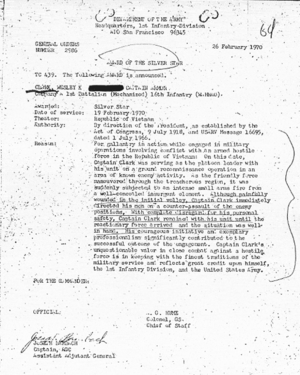
In July 1969, Clark went to Vietnam during the war. He first worked as a staff officer, helping plan operations. He earned a medal for his work. In January 1970, he took command of an infantry company. Just one month later, he was shot four times by an enemy soldier. Even wounded, Clark kept shouting orders to his men. They fought back and won the battle. Clark was injured in his shoulder, hand, hip, and leg. He was sent to a hospital to recover. He received the Silver Star medal for his brave actions.
While recovering, Clark became Catholic, his wife's religion. He decided to continue his military career beyond his initial commitment. He completed more training and taught at West Point. He then attended the Command and General Staff College. He graduated as a top student and earned another master's degree. He was promoted to major.
After Vietnam
In 1975, Clark became a White House Fellow. He worked as a special assistant in the government. He also helped with the movement to create the Vietnam Veterans Memorial. From 1976 to 1978, he served in Germany with the 1st Armored Division. His commanders praised his exceptional talent. He was awarded a medal for his service.
General Alexander Haig, a top commander, personally chose Clark to join his staff. Clark worked on policy reports and helped with military exercises. He was promoted to lieutenant colonel and received another medal. He then served in Colorado, leading an armor battalion. He was promoted to full colonel in 1983.
Clark continued to rise through the ranks. He worked in Washington, D.C., and then commanded a training center at Fort Irwin Military Reservation. He earned more awards for his leadership. In 1986, he commanded a brigade at Fort Carson. One of his commanders called him "the most brilliant and gifted officer [he'd] ever known." In 1989, he was promoted to brigadier general.
From 1989 to 1991, Clark commanded the National Training Center. Many National Guard units trained under his command during the Gulf War. Generals praised his training methods. He then worked on developing new strategies for the Army after the Cold War. He pushed for using technology to create a "digital network" for military command. He was promoted to major general in 1992.
Leading the 1st Cavalry Division
Clark then took command of the 1st Cavalry Division at Fort Hood, Texas. He led forces from Fort Hood on three peacekeeping missions to Kuwait. His performance report called him "one of the Army's best and brightest." He received a medal and was promoted to lieutenant general in 1994.
Clark then worked on the staff of the Joint Chiefs of Staff. He helped create and coordinate U.S. military policy worldwide. He was involved in the Dayton Agreement, which helped end the Bosnian War. He also worked on nuclear talks in Korea and plans for Haiti.
United States Southern Command
In 1996, Clark was promoted to full general. He was appointed to lead the United States Southern Command (USSOUTHCOM). This command oversees U.S. military activities in Central and South America.
In the Balkans
Bosnia and Herzegovina
Clark was involved in planning responses to the war in Bosnia and Herzegovina. He met with Bosnian Serb military leaders, including Ratko Mladić. Mladić was later accused of serious crimes. A photo of Clark exchanging hats with Mladić caused some discussion. Clark later said he regretted the exchange.
Clark was part of a diplomatic team working for peace in Bosnia. The team eventually reached the Dayton Agreement in Ohio. This agreement helped end the Bosnian war in 1995.
In 1997, Clark was appointed to lead the United States European Command. This position also made him the Supreme Allied Commander Europe (SACEUR). This meant he was in charge of all NATO military forces in Europe.
Kosovo War
The biggest event during Clark's time as SACEUR was NATO's involvement in the Kosovo War. After peace talks failed, Clark was ordered to begin bombings. These bombings, called Operation Allied Force, started on March 24, 1999. They aimed to stop the fighting in Kosovo.
The bombing campaign faced some challenges. NATO bombed the Radio Television of Serbia headquarters. This attack killed civilian employees. NATO said the station was used for propaganda. Another incident occurred when NATO accidentally bombed the Chinese embassy in Belgrade. Three Chinese journalists were killed. Clark's intelligence officer took responsibility, but Clark supported him.
The bombing campaign ended on June 10, 1999. The leader of Yugoslavia, Slobodan Milošević, agreed to international conditions. Yugoslav forces began to leave Kosovo. NATO did not lose any soldiers in combat during the operation.
Incident at Pristina Airport
One of Clark's most talked-about decisions happened at Pristina International Airport after the Kosovo War. Russian forces arrived at the airport, expecting to help police the area. Clark wanted NATO forces to control it. He ordered British forces to block the Russians.
However, the British commander, General Mike Jackson, refused. He said he would not start a "Third World War." Jackson believed it was too risky to confront the Russians militarily. Instead, he had troops surround the airfield. The situation lasted two weeks. Eventually, an agreement was reached for Russian forces to join peacekeeping duties.
Clark was later asked to step down from his position two months earlier than expected. General Jackson continued his career and became the highest-ranking officer in the British Army.
Retirement from the Military
In July 1999, Clark was told he would leave his command in April 2000. This was earlier than expected. He believed it was a "routine personnel action." However, some rumors suggested it was due to disagreements he had with officials in Washington, D.C. General Hugh Shelton, a former Chairman of the Joint Chiefs of Staff, later made comments that suggested issues with Clark's "integrity and character," but he never explained further. Clark retired from the military on May 2, 2000.
Civilian Career
After retiring, Clark began a career as a public speaker. He also took on roles with investment firms and defense-related companies. He wrote two books about modern warfare. He also wrote introductions for military biographies and articles.
Clark also became a member of the Atlantic Council's board of directors.
2004 Presidential Campaign
Clark has said he truly defined his political views after his military retirement. He did not support the Iraq War. He felt that American foreign policy was "starting to go wrong" under President George W. Bush.
Clark decided to run for president in the 2004 election. He met with supporters who encouraged him to run. He announced his candidacy for the Democratic presidential primary on September 17, 2003. He was a late entry into the race.
Some people questioned Clark's loyalty to the Democratic Party. He had been an independent voter during his military career. Clark explained that he realized he was a Democrat because he supported things like education, healthcare, and international cooperation.
Clark faced challenges during his campaign. He was new to politics and sometimes struggled with quick answers for the media. For example, he was asked about his vote on the Iraq War. His answers were sometimes unclear, leading to headlines that suggested he supported the war, even though he opposed it.
Another media moment happened when he talked about space exploration. He joked about believing in going "beyond the speed of light." This led to many humorous headlines.
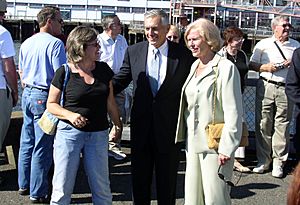
Clark performed well in some early polls. However, he chose not to participate in the Iowa caucuses. This was a turning point in the campaign. He won the Oklahoma primary but withdrew from the race on February 11, 2004. He then endorsed John Kerry. Clark later said that not participating in Iowa was one of his biggest mistakes.
After the 2004 Campaign
Clark continued to support John Kerry throughout the 2004 presidential campaign. He founded a political action committee called WesPAC in April 2004. He also became a military and foreign affairs analyst for Fox News Channel. He joined the Burkle Center for International Relations at UCLA.
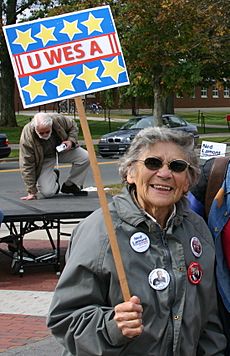
Clark actively campaigned for many Democratic candidates in the 2006 midterm elections. His PAC helped 42 Democratic candidates win their elections. He was a popular speaker for the Democratic Party.
In his 2007 memoir, A Time to Lead: For Duty, Honor and Country, Clark shared a conversation he had after 9/11. He said a senior general told him about discussions for future military actions in several countries. Clark has stated that he believes the 2003 invasion of Iraq was a "huge mistake."
Clark serves on several advisory boards. He was also chairman of an investment bank called Rodman & Renshaw. He was featured in a documentary film about the company's business challenges.
2008 Presidential Campaign Speculation
Clark was considered a possible candidate for president in 2008. However, he decided to endorse Hillary Clinton. He campaigned for her in several states. After Barack Obama won the Democratic nomination, Clark supported him. Clark was also considered as a possible running mate for Obama.
McCain Military Service Discussion
On June 29, 2008, Clark made comments about Republican John McCain's military service. He said that while he honored McCain's service as a prisoner of war, it didn't automatically qualify him to be president. Clark said, "I don't think riding in a fighter plane and getting shot down is a qualification to be president." Both the McCain and Obama campaigns disagreed with his specific wording. Clark later clarified that he deeply respected McCain's service. He said his concerns were about McCain's judgment on national security policy.
Reality Television
In 2012, Clark hosted a reality TV show called Stars Earn Stripes. The show featured celebrities competing in challenges based on military exercises.
Awards and Honors
Wesley Clark has received many awards and honors throughout his career. His military awards include the Defense Distinguished Service Medal and the Silver Star. He has also received international honors, including knighthoods. As a civilian, he received the Golden Plate Award in 1998. In 2000, he was awarded the Presidential Medal of Freedom.
The people of Gjakova, Kosovo, named a street after him. This was to honor his role in helping their city and country. A boulevard in Madison, Alabama and a new street in Virginia Beach, Virginia, are also named after him. He is a Fellow at the Burkle Center for International Relations at UCLA. In 2000, he was made an honorary Knight Commander of the Most Excellent Order of the British Empire. In 2013, he received the Hanno R. Ellenbogen Citizenship Award.
See also
 In Spanish: Wesley Clark para niños
In Spanish: Wesley Clark para niños
 | Janet Taylor Pickett |
 | Synthia Saint James |
 | Howardena Pindell |
 | Faith Ringgold |


